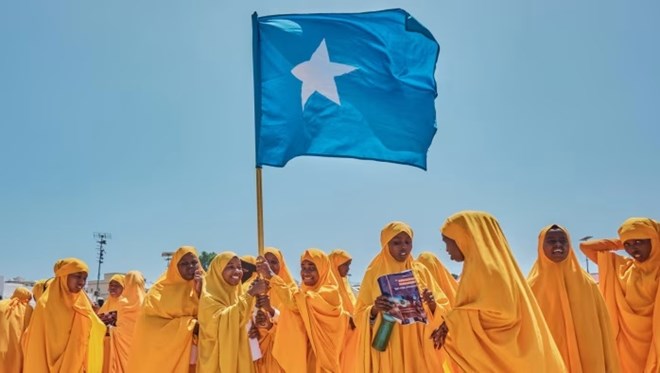[ad_1]

Thursday January 11, 2024
By Gioia Shah

Somalia has called the deal ‘an act of aggression’ and said it was prepared to defend the country’s sovereignty and territorial integrity © Abdishkuri Haybe/AFP/Getty Images
Somalia has demanded that Ethiopia rip up the agreement signed last week that would give Addis Ababa access to a stretch of Somaliland’s coastline, a move that has boosted the autonomous territory’s quest for statehood.
Landlocked Ethiopia on January 1 opened dialogue to formally recognise Somaliland, in return for a 50-year lease on a 20km strip of land around the Gulf of Aden port of Berbera.
The memorandum of understanding signed by Ethiopia’s Prime Minister Abiy Ahmed and Somaliland President Muse Bihi Abdi has sparked tensions in the volatile but strategically important Horn of Africa region that bridges the Middle East and Africa.
Daud Aweis, Somalia information minister, told the Financial Times that it was “solely up to the Ethiopians to make sure they retract this kind of mess they’ve created”. An Ethiopian move to recognise breakaway Somaliland would “bring havoc to the whole continent”, where many countries are currently battling separatist movements, he added.
Somaliland, which declared independence from Somalia in 1991, is in many ways a de facto state with its own functioning government and, analysts say, greater stability than the rest of Somalia. Yet no country has formally recognised it as an independent nation.
Somalia has called the January 1 agreement, which would allow Ethiopia to establish a naval base at Berbera, “an act of aggression” and said it was prepared to defend the country’s sovereignty and territorial integrity. “Not an inch of Somalia can or will be signed away by anybody,” Somalia President Hassan Sheikh Mohamud wrote on X.
Although the deal is not legally binding, the US, African Union and the east African IGAD bloc have all raised concerns over its potential to cause a new rift in a region beset by armed hostilities and humanitarian crises.
The Horn of Africa is a strategically vital region that borders the Red Sea, one of the world’s most vital maritime corridors through which nearly 15 per cent of global seaborne trade passes.
The importance and vulnerability of the corridor have been highlighted by recent attacks on commercial ships by Yemen’s Houthi rebels, which have forced vessels to reroute and sent transport costs soaring. Access to the region’s ports has been coveted by Gulf states as well as Russia, Turkey and China.
Ethiopia, which is still recovering from a brutal and costly two-year civil war that formally ended in 2022, has much to gain from the Somaliland port deal, according to analysts. The country of 123mn people, which last month defaulted on its sovereign debt, has been seeking ways to regain access to the sea ever since the 1991 breakaway of Eritrea left it landlocked.
Ethiopia currently relies on the port of Djibouti, through which 95 per cent of its goods flow. But coastal access would allow the country to “establish facts on the ground” that it was a Red Sea nation, said Hassan Khannenje, director of the HORN International Institute for Strategic Studies, a Nairobi think-tank.
This would strengthen Ethiopia’s hand against other regional powers such as Egypt, he added. Addis Ababa and Cairo have an ongoing dispute over a huge dam built on the Blue Nile.
For Somaliland, the deal with Ethiopia had brought the question of recognition back into discussion, Khannenje said. During its 30-year-long quest for statehood the region has established a diplomatic presence in several countries including the UK and the US and has in turn attracted consulates to its capital Hargeisa in large part due to its relative stability and safety.
The Somaliland deal carries risks for both Ethiopia and Somalia, experts said. Neither can afford hostilities, with Somalia already fighting a long-running insurgency by the al-Shabaab terror group. While analysts believe war is unlikely, there is scope for tensions to grow further.
It has also been met with opposition within Somaliland, with its defence minister reportedly resigning in protest.
Ethiopia is also likely to need funding if it is to establish a new port, navy and the other infrastructure that would be required. Analysts said this could come from the United Arab Emirates, which has close relations with both Ethiopia and Somalia.
The Gulf country has been expanding its influence in the Horn of Africa, including at Berbera port, which the Emirati logistics group DP World has been upgrading. It also backed the Ethiopian government during the conflict in the Tigray region and is involved in Sudan’s civil war, where it has been accused of backing the paramilitary forces fighting the country’s army.
[ad_2]
